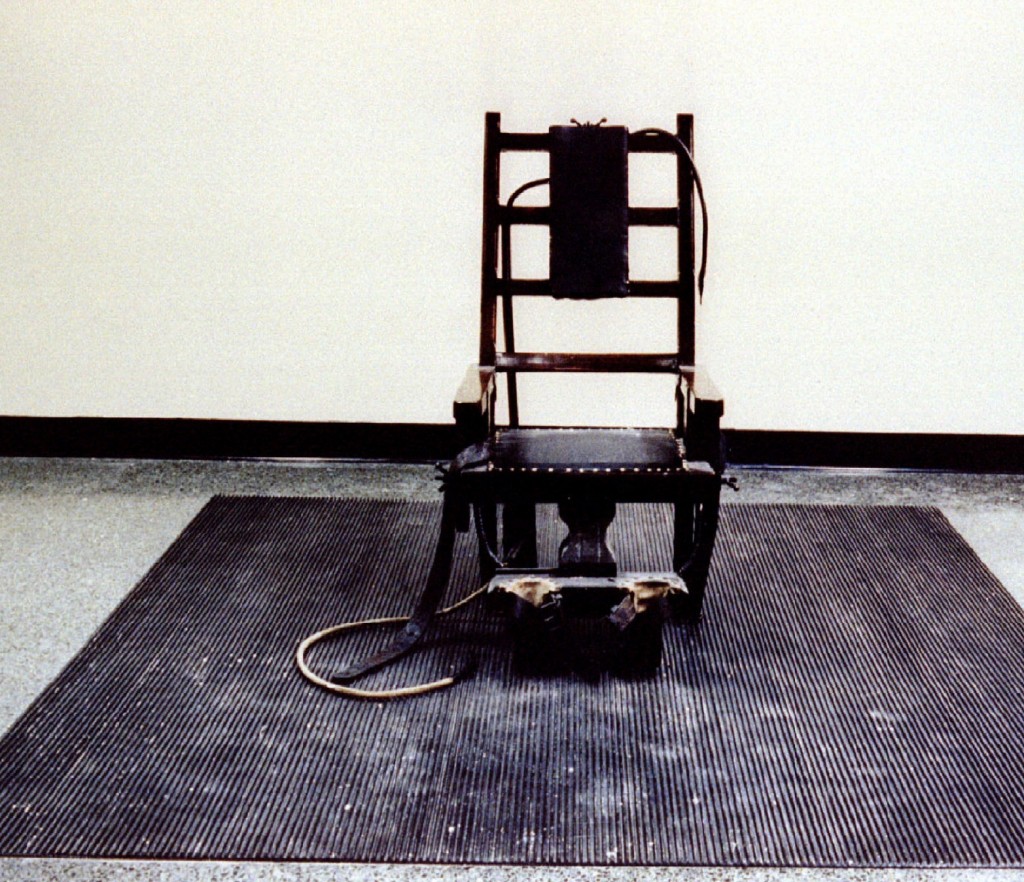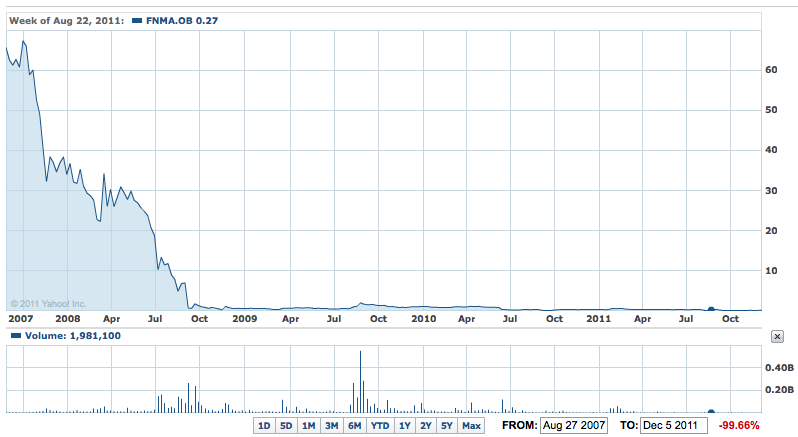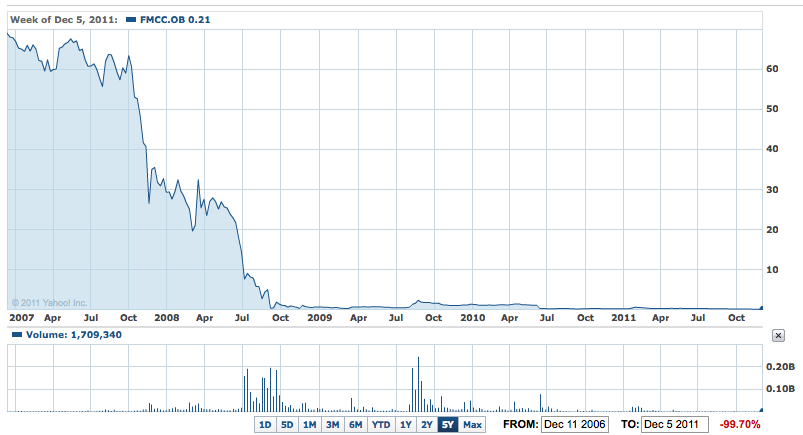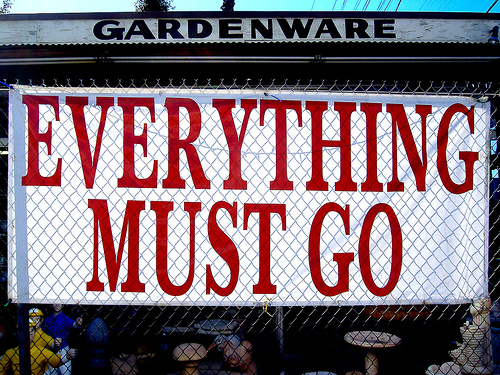Not that many years ago, real estate was regarded as a safe investment. Now it’s the butt of jokes. What happened?
Fannie Mae (formerly the Federal National Mortgage Association) is one of the government-sponsored enterprises entrusted with making it easier for people to afford homes. Its sibling, Freddie Mac (né Federal Home Loan Mortgage Corporation), is another. A cousin, Ginnie Mae (Government National Mortgage Association) does pretty much the same thing, the big difference being that Ginnie Mae doesn’t pretend to be a private company.
One-paragraph summary:
You borrow money from ABC Bank to buy a house. Now you have a house, and ABC has your promise that you’ll pay them, say, $250,000 (with interest) over the next 30 years.
(On second thought, there’s no way in hell we can do this in one paragraph.)
That promise, from ABC’s perspective, is an asset. Of course it is, it’s money coming in. An annuity, if you will. ABC can then sell that asset to a secondary lender (ABC is the primary lender, duh) such as Fannie Mae.
ABC now has cash from Fannie Mae, cash that ABC can loan out. Loaning out money is the very purpose for a bank’s existence, thus ABC is happy with this situation. If ABC loans that money out to someone else for a mortgage, then if all goes according to plan, now you and that other person will own houses, instead of just you.
Fannie Mae was founded by the federal government in the 1930s, under the principle that having as many people as possible owning houses (and, by extension, owing banks money) was a goal worth pursuing. The logic went that with more liquidity – i.e., more money to be loaned out – not only would more people be able to afford homes, but mortgage interest rates should lower, too. A self-perpetuating cycle of easy loans for everyone!
I don’t understand what Fannie Mae is getting out of this. Wouldn’t they have to pay a premium to ABC for the transaction to be worth ABC’s while?
Yes. Fannie Mae pays the bank a ¼% servicing fee for the life of the loan.
Oh, I see. So Fannie Mae loses money on every loan. Sounds like a great way to do business.
Fannie Mae gets to borrow from the U.S. Treasury at extremely favorable rates. Currently ¾%. So with the average 30-year mortgage going for about 3.96%, Fannie Mae comes out way ahead.
So it’s the U.S. Treasury that’s losing money on every loan.
Yes! Isn’t “capitalism” great?
Now, Fannie Mae doesn’t just hold onto that money. It assembles your $250,000, your neighbor’s $281,384.34, and several other mortgagors’ loans into a multimillion-dollar mortgage-backed security. Then it sells that mortgage-backed security to an underwriter. The underwriter pays a higher interest rate to Fannie Mae than the ¾% at which Fannie Mae borrows from the U.S. Treasury, so Fannie Mae is happy. The underwriter is happy, because it has cash on hand (again, to loan out) and is paying a fairly favorable interest rate. But that rate is artificially low, because it’s based on the artificially low rate that Fannie Mae borrows from the U.S. Treasury at.
Isn’t this creating money out of thin air?
It’s creating “liquidity” out of thin air, which is almost the same thing.
With the creation of Fannie Mae and its relatives, the federal government effectively lowered the requirements for a prospective homeowner to get a mortgage. To the point where people who weren’t yet ready to own houses were owning houses. Some of whom were never going to be able to pay their mortgages back, and who got foreclosed upon.
Well, couldn’t lenders just charge those people sufficiently high interest rates that it’d be worth the increased risk to lend to them?
Of course not, this is America.
In the ‘90s, the government ordered Fannie Mae to keep a minimum percentage of its loans in mortgages for “low- and moderate-income” borrowers. By 2007, fully 55% of Fannie Mae’s loan originations were with such borrowers. The government then prohibited Fannie Mae – which is to say, the primary lenders who sold loans to Fannie Mae – from charging “predatory” rates.
So lenders were left with two choices: continue doing business with Fannie Mae, and risk losing money on bad clients; or don’t do business with Fannie Mae, and set their own high rates for borrowers with poor credit histories who didn’t deserve to borrow money at prime rates (the infamous “subprime market”.)
If lenders went with option B, they could create their own mortgage-backed securities, with higher interest rates and higher volatility. Those privately fostered mortgage-backed securities then hit the market, at which point people stopped buying Fannie Mae’s mortgage-backed securities (at their comparatively low interest rates.)
So Fannie Mae started offering higher, more competitive interest rates. The free market at work, right?
Sure, except Fannie Mae and Freddie Mac only pretend to be private corporations with stockholders and everything. The federal government goes to great lengths to explain that Fannie and Freddie are not branches of itself. Functionaries can quote you the 1968 act that led to Fannie Mae being named an “independent” company. In reality, the government wanted to remove Fannie Mae’s obscene levels of debt off the national balance sheet (cf. Abraham Lincoln, a tail ≠ a leg). Investors and customers alike continue to treat Fannie Mae as a branch of the government, with an implicit government guarantee if not an explicit one. Put it this way: if your elected representatives committed billions of dollars of your tax money to AIG, General Motors and Chrysler, they’ll do it for Fannie and Freddie. Again.
Which would you rather invest in, assuming each had the same credit rating: private or Fannie Mae mortgage-backed securities?
The latter offered returns similar to the former, only with that implicit guarantee. Therefore people bought more of them. To create more mortgage-backed securities, Fannie Mae made more and more low-interest, sketchily underwritten loans. A private bank like Lehman Brothers can die a quick death and leave the remaining banks healthier. But there’s no concept of culling the herd when it comes to Fannie Mae.
(There is nothing government can’t ruin. Vote Ron Paul.)
Meanwhile, because of the low mortgage rates Fannie Mae was responsible for spawning in the first place, millions more people bought houses than otherwise would have. Too many people chasing too few houses means prices rose. A “bubble”, if you will. Then borrowers started defaulting, and lenders realized that they didn’t have enough collateral to cover debts.
When there’s downward pressure on primary mortgage loans, and upward pressure on secondary mortgage loans, something has to give. Add to that the underqualified people who couldn’t make their mortgage payments, and thus got foreclosed on, and the result was even more houses sitting empty. By 2008:
- Fannie Mae and Freddie Mac either owned or guaranteed half the residential mortgages in the country.
- As “independent businesses”, “free of governmental control”, and publicly traded, their stocks began to drop. In the case of Fannie Mae, 99.66%:
It’s almost impossible to lose a higher percentage than that, yet Freddie Mac managed:
- As investments, Fannie Mae and Freddie Mac were effectively worthless.
- The Secretary of the Treasury, operating under the orders of his boss, lied through his teeth and told the public that Fannie Mae and Freddie Mac were financially sound. No one who’d examined the issue could possibly believe this, but the public at large might have.
- Someone owned Fannie Mae’s and Freddie Mac’s mortgage-backed securities. Actually, lots of people. Foreign governments, retirees’ pension funds, etc. The argument went that if Fannie Mae and Freddie Mac were officially deemed worthless, disaster would occur. As if requiring half a trillion dollars from American taxpayers didn’t qualify as a disaster.
So the federal government did exactly that, putting you on the hook for every horrible decision made by entities that created no value in the first place, and distorted the market by their very existence. It would have been less damaging to have simply cut a five-digit check to each family that wanted a house and didn’t have the money for it.
Fannie Mae and Freddie Mac aren’t subject to the same capital and diversification requirements that private banks are. Nor do Fannie and Freddie ever have to worry about having their loan portfolios reviewed by regulators, nor rely on those same regulators to give them a safety and soundness rating.
Today, Fannie and Freddie continue to have a hand in most residential mortgages. They still lose staggering amounts of money – $14 billion and $22 billion last year, respectively. And as we’ve seen, their stocks now trade on the over-the-counter bulletin board, the Canadian Football League of securities trading.
Fannie Mae’s chairman made $6 million (of your money) last year, Freddie Mac’s $4 million. Yet none of those Occupy Wall Street vermin protested outside their respective headquarters. Merry Freaking Christmas.
This article is featured in:
**Top Personal Finance Posts of the Week: Apple is Kicking Google’s Tail Edition**







Financial Retard of the Month, By Request
Our relationship was fleeting, but intense
We swear to God, we don’t go looking for this stuff.
Let’s just give Trent Hamm of The Simple Dollar the lifetime achievement award, Retard of Eternity, and be done with it. But even Trent Hamm at his cheapest doesn’t complain about the hand life dealt him. Far from it, in fact. He sees possibility in everything, even a gently used Ziploc bag or a toothpaste tube with a milligram of Crest left inside.
No, for complaining about the world and the curveballs it throws we have to go to the profane, portly woman at So Over Debt, the most self-defeating honoree we’ve had so far. Her site’s very subtitle illustrates the problem:
What do we have there?
Self-categorization. Is it relevant that she had a child, and doesn’t have a husband? She thinks it is.
Pessisism writ large. “not to financial freedom, because that’s out of reach”. Why? One of the Control Your Cash principals was a single mom at one point – and a college dropout, unlike the highly educated Ms. So Over Debt – and financial freedom wasn’t out of reach for her.
(This is why we started the RotM series. Most of our winners so far have been people who live their lives not even realizing that they are living, breathing bad examples. People who can’t get ahead financially and can’t understand why, even though the answer is staring them in the face [if they happen to be looking in the mirror.] Buy assets, sell liabilities isn’t just a mindless mantra to be recited, it’s a never-fail method for building wealth. And something this month’s winner would never bother applying to her life, not when she can make excuses and blame the world.)
Ms. So Over Debt’s 2-part bio illustrates the problem in even greater detail. She explains why she’s poor, or at least incapable of financial freedom. She had a kid at 15, spent tons of money on a college degree that enables her to now take home somewhere in the neighborhood of $600 per pay period in her chosen field, got divorced, and smokes. We’re not sure about you, but that sounds to us like the kind of person who should be writing about personal finance. But still, every part of her misfortune is someone else’s fault:
From “under (you)”? Because you have a say in the transfer of someone else’s house? It doesn’t matter if you paid the rent on time, or never did. The house is the landlord’s to sell as he wishes. That doesn’t mean he can kick you out before your lease is up, assuming you’re honoring its terms, but his decision to sell an asset has nothing to do with your promptness or delinquency. Although it’s adorable that you think it might.
And if being told the house you live in is being sold (or more to the point, that your lease isn’t being renewed) results in crying, how do you handle legitimate crises?
Multiple-choice quiz time. Will she use the death of a grandparent as an excuse for some other misfortune?
The answer is c), Of course.
Lady, grandparents die. It’s what they do. Most of us grieve briefly, remember the good times if any and move on. But we have to admit, your method sounds way more exciting.
This woman is exemplary for showcasing how to never, ever build wealth:
And then, seconds later:
Which links to a post titled “I’ve Really, Really Screwed Up”, which contains the following piece of inspiration:
Then, the dizzying crescendo:
We’re sure the old boss would be delighted to know how highly you think of the old job. Hell, who wouldn’t want to hire someone like that? Grab her now while she’s still on the market!
The larger point is that living at the mercy of bosses (whom you might have to go back and grovel to) is no way to live. No wait, there’s a still larger point. Which is that effort is no substitute for results:
It’s awesome when a slow learner proves our points for us.
First off, you didn’t make good choices. You made mind-boggingly awful choices, such as starting a new job without even knowing the pay scale.
And let’s requote her quote, seeing how poignant it is:
See above. Having a spouse to pick up the slack, or at the very least not eliminating a spouse from your life, is a great way to not be poor.
We were going to present her with the Retard of the Month prize (a carton of Marlboros, a trial membership to Match.com, an illustrated brochure that explains how to safely use a treadmill, and a voucher for one free class at the trade school of her choice, so she can learn at least one marketable skill), but fate intervened. Not only did she prevent us from commenting on her site, she took her ball and went home.
It takes an especially sensitive little girl to a) forbid non-spammers from posting on her site, and b) deny them access to her server. No wonder she cries when her landlord makes a transaction she doesn’t like. Ms. So Over Debt, this one’s for you. Try not to cry (again).